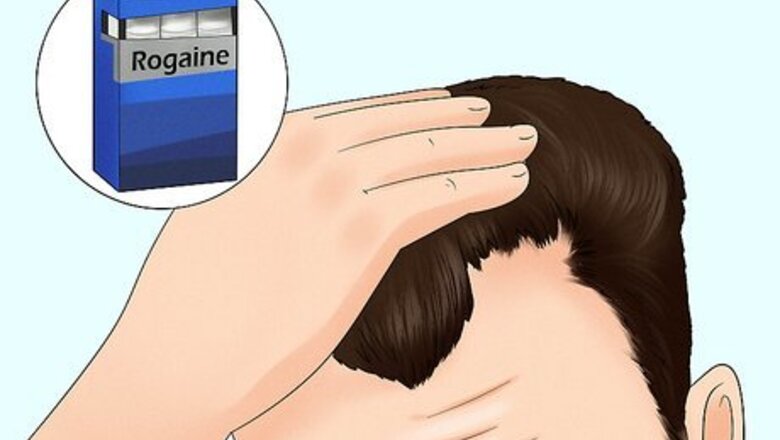
views
How can I regrow my receding hairline?
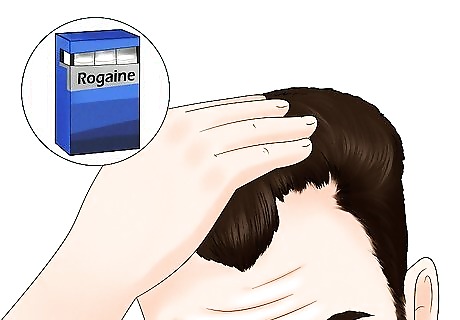
Massage Rogaine (minoxidil) into your hairline to stimulate growth. Topical minoxidil is fairly effective at promoting hair regrowth, and it’s really easy to use. Apply the treatment directly to your scalp and massage it into your skin. Use the product as directed for a few months and you should see your hair growing back. Unfortunately, you normally have to keep using the product and if you stop, your hair may start falling out again. While many of these products are available over-the-counter, you may be able to get a stronger version if you visit your doctor and get a prescription. Your insurance may even cover the cost! Unfortunately, minoxidil doesn’t seem to work for all people. In certain cases, the topical treatment won’t be strong enough to combat your receding hairline.
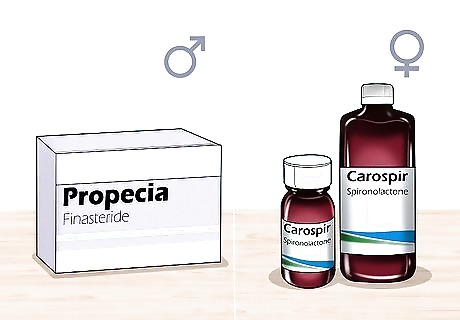
Ask a doctor about finasteride or spironolactone for oral treatment. There are a few oral medications that have helped people regrow a receding hairline. Finasteride (Propecia) is specifically for men, and it can curb the rate of hair loss. Some men even notice hair growing back after a few months. Spironolactone (Carospir/Aldactone) is ideal for women, and helps with hair loss trigger by hormonal imbalances. Dutasteride (Avodart) is a less-popular treatment option, but it can help minimize shrinking hair follicles. These oral medications aren’t as popular as the topical treatments, but they’re a low-risk solution if
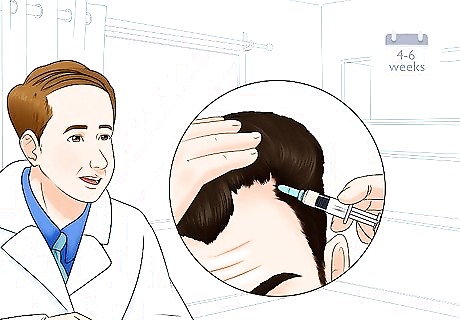
Visit a dermatologist and ask about steroid injections. To see if injections are right for you, visit a dermatologist. They’ll be able to take a closer look at your skin and hair to tell you the best possible treatment for you based on your age and condition. If they think steroid injections are your best bet, make an appointment for the first round of treatment. These injections are highly effective at stimulating growth! If you go this route, you’ll get multiple small injections every 4-6 weeks. You should see regrowth after 1-2 months. There are laser treatment options as well if you’re not fond of needles. These treatments are cutting edge, so they aren’t nearly as popular, but they do work for some folks!
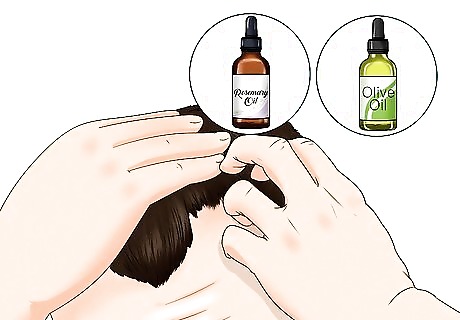
You can try a rosemary and olive oil massage for a natural option. Make a diluted solution by mixing a few drops of rosemary oil in olive oil. After every shower you take, massage the oil solution into your hairline and let it be. Not only will your hair smell good, but after a few months your hairline may start growing back! There are no specific guidelines here regarding dosage, but you should be safe with a 1-2% dilution. In other words, if you use 1 cup (240 mL) of olive oil, you should use 0.5–1 teaspoon (2.5–4.9 mL) of rosemary oil. There are a lot of DIY treatment options that don’t work, but rosemary oil is one of the few natural options that may conceivably work. There are a lot of studies out there that suggest rosemary may promote hair regrowth. The same way minoxidil doesn’t work for everyone, rosemary oil may not be the ideal solution for you. You may see similar results with peppermint oil if you prefer to use that.
How do I bring my hairline forward?
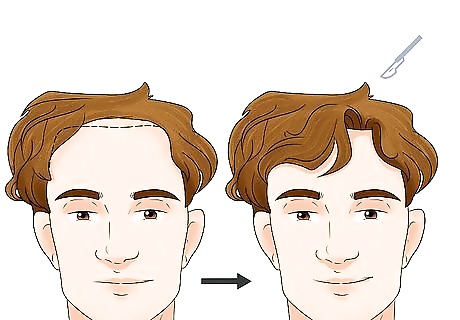
Your best bet is a hair transplant procedure. If your hairline is naturally a little far back for your taste, there aren’t any treatment options that will stimulate hair growth where you never had hair in the first place. However, you can get a transplant procedure! See a dermatologist or cosmetic surgeon and ask them about the viability of a hair transplant. It isn’t for everyone, but it is effective if you want to move your hairline forward. While this will work if you just want to move your hairline, it won’t work all that well for hairline restoration. If you’re naturally losing your hair, you’ll continue to naturally lose your hair after you get the transplant. The cost of this procedure will depend on the amount of hair you want transplanted, but it typically costs $3,000-6,000 to have this operation performed. David Kingsley David Kingsley, Trichologist and Hair Expert Addressing a receding hairline requires a comprehensive approach of prevention and treatment. Understanding the underlying causes and available options is crucial. Take proactive steps like using FDA-approved medications such as minoxidil and finasteride, and consider advanced treatments like hair transplants. Acting early and seeking professional guidance to develop a personalized plan can help effectively manage and potentially reverse a receding hairline.
Is hairline lowering dangerous?
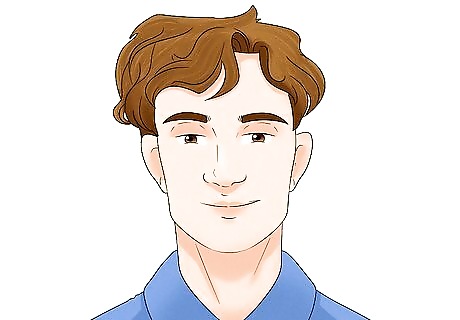
Transplant procedures are relatively safe, but there can be complications. You won’t be put under entirely for a hair transplant, and the procedure can be painful for some folks. Like any surgical procedure, you may have some bleeding and scarring, and you could run into an infection if you don’t follow the aftercare instructions properly. With all things considered though, this procedure isn’t uniquely dangerous and you shouldn’t have anything to worry about. There is also a risk that the procedure won’t totally work. Sometimes, the hair plugs implanted in your hairline won’t take, and you may need to get the procedure again.
What can I do to prevent my hairline from receding?
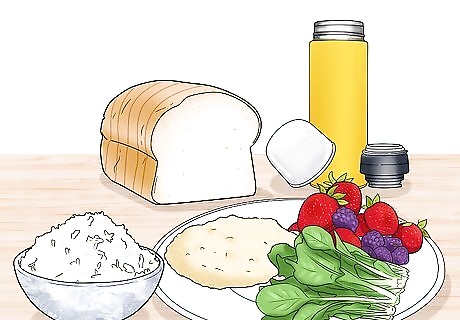
Eat a healthy, balanced diet and stay hydrated. If you take care of your body, your body will take care of your hair. While there isn’t anything you can really do for hereditary hair loss, you may be able to prevent accelerated hair loss by eating a healthy, balanced diet and drinking plenty of water every day. In addition to helping your hair out, you’re going to feel much better every day! Smoking may make your hair fall out as well. If you’re a smoker with a receding hairline, quitting may slow your hair loss. Putting the butts down is going to be good for your health as well!
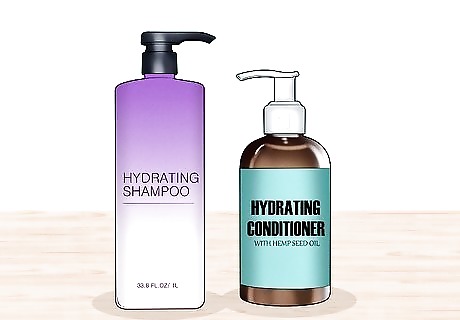
Lock in moisture by using a shampoo and conditioner daily. Using a hydrating shampoo and conditioner will keep your hair clean, healthy, and hydrated. The dryer your hair is, the more likely it is to fall out, so maintaining healthy hair and not overdoing it with the products may prevent early hair loss. The less you do to mess with your hair, the better. If you’ve been using a ton of mousse or gel for the past few years, cutting back may help your hair.
Does coconut oil help a receding hairline?
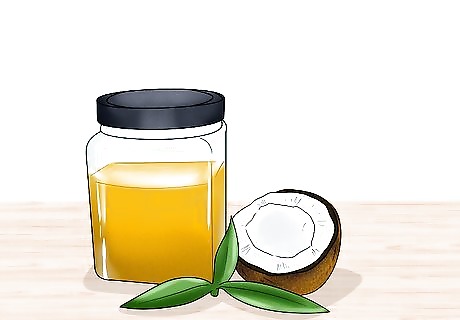
There’s no evidence it grows hair, but it does moisturize it! Coconut oil is going to function basically the same way as conditioner, since the oil will help lock in moisture and keep your hair healthy. It may also help prevent your hair from getting tangled. While coconut oil isn’t bad for your hair, there’s no evidence it will actively help hair grow. Coconut oil is also a solid choice if you’re looking to moisturize your skin. If your scalp tends to dry out or itch a lot, coconut oil may help!
Does castor oil regrow hair?
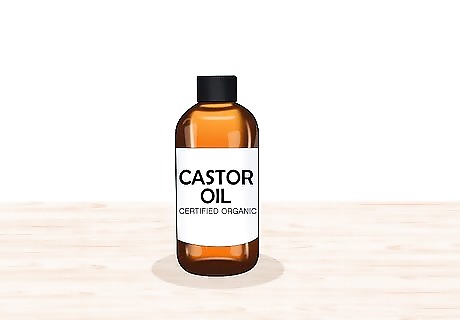
There is no evidence that castor oil helps hair regrow. Castor oil is a lot like coconut oil in the sense that it will probably help lock in moisture. However, locking in moisture doesn’t necessarily help hair grow back. At the same time, there have been several cases where castor oil has caused hair to become permanently brittle and stiff. It’s possible that castor oil may do something to help hair grow, but it seems unlikely and there are obvious risks with this.
Does light therapy help hair regrow?
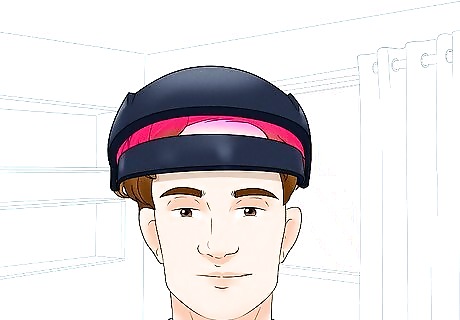
Yes, there’s some evidence that light therapy helps with hair loss. There are all kinds of LED helmets out there that supposedly help with hair loss. A lot of people think they look kind of silly and unscientific, but they’re actually fairly helpful when it comes to regrowing hair. Get an LED hair stimulation helmet and wear it every other day for at least 25 minutes. You may see a significant regrowth after 16 weeks or so! Some of these devices are better than others. Buy a unit that’s been approved by the FDA for the best results! It’s a little unclear why these devices work, but it does appear that they’re helpful if you use them regularly.
Can scalp massages help hair regrow?
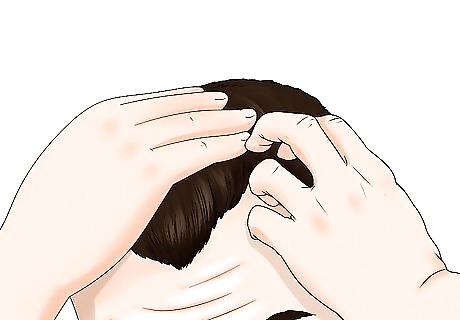
They may help with hair thickness, but it’s not clear if they help hair grow. There have been very few studies on scalp massages and hair growth, but it does appear that scalp massages help with thickness and volume. If you give yourself a 10- to 15-minute scalp massage every day, your hair may appear thicker. This can make it look like you’ve got a fuller head of hair than you do, but it may not help hair grow. This is a harmless thing to try since there are no side effects, so if you want to give scalp massages a shot, go for it! It’s possible that scalp massages will help hair grow in the sense that they’re relaxing, since de-stressing can minimize hair loss.
Does stress really cause hair to fall out?

Yes, the stress hormone—cortisol—messes with hair follicles. It’s no secret that stress can causes a variety of health problems, and hair loss is definitely one of them. If you’re under frequent stress, find a relaxation technique that works for you and start fighting back! Meditation, deep breathing exercises, and yoga are all great ways to relax. If you’re under chronic stress, going to cognitive behavioral therapy can teach you how to cope with the stress you’re experiencing. Take a break every now and then. If you’re grinding so hard at work that you don’t have anything to look forward to on the weekend, your health is going to suffer. Set aside time every day to do something you care about. Whether it’s practicing an instrument you enjoy or watching a movie with a loved one, it’s important to have things to look forward to when you’re dealing with regular stress.
Can a teenager have a receding hairline?
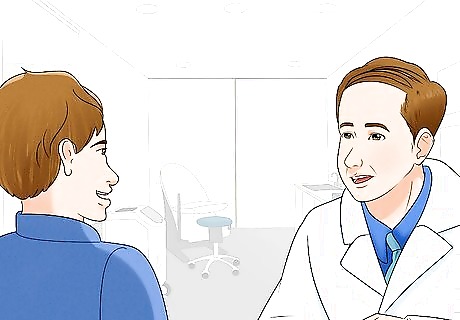
It’s possible, but you should see a doctor just to be on the safe side. Hair loss is almost always genetic, so it’s possible that your hair loss isn’t a symptom of anything. However, teenage hair loss is rare enough that you should see a doctor to get a medical examination. It’s likely that there’s nothing wrong with you, but it’s still worth checking out. There are certain hormonal conditions, medications, and diseases that can cause hair loss in a teenager. You may need to get a blood test and review your current medications with your doctor just to be safe. Stress can cause your hair to start falling out. Being a teenager is hard, and if you’re stressed out all of the time, this could be the problem. Luckily, it should grow back once you get through whatever’s stressing you out!










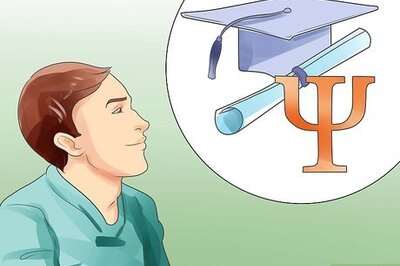






Comments
0 comment